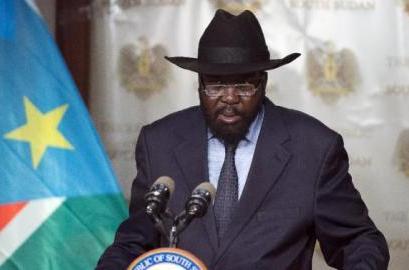South Sudan rejects international pressure to reverse creation of 28 states
October 7, 2015 (JUBA) – South Sudanese government said Wednesday it would not reverse presidential order creating and dividing the country into 28 states in violation of the peace agreement which it has signed with the armed opposition fighters allied to the former vice president, Riek Machar.

But senior officials loyal to president Kiir have defied the international calls to suspend the decision, claiming the president acted in the interest of the people of South Sudan.
“The decision of the president is constitutional. It does not contravene any provisions in the constitution. The president acted within the law to serve the interest of the people from whom the constitution gets the basis,” said Martin Lomuro, cabinet affaris minister, in a briefing to reporters on Wednesday.
The will of our people is one of the sources of the constitution. The constitution talks about decentralization and the people who have always asked for devolution of powers to the lower level government. This could not be done in time because the government, as you know, was preoccupied with the implementation of the CPA (comprehensive peace agreement) and the referendum and then came this senseless war,” he echoed the previous explanations by president Kiir.
He said now that peace had come, the president and the government felt it was time to respond to this long standing demand of the people.
Lomuro denied that the creation of more states violated the peace agreement, claiming it has instead given the armed opposition forces more gubernatorial positions in the states they were given the upper hand to appoint or to make nominations for those who would become governors during the period of 30 months of the transitional period of the government of national unity.
“The order of the president has instead enriched the agreement even further. It gives the opposition more seats. Actually the order helps them to accommodate more of their members. They will now have 6 governors. The power ratio has been altered. The rebels will continue to get 40% of the power sharing in the [further divided] states of Upper Nile, Jonglei and Unity,” he added.
The presidential decision has received mixed reactions, with proponents claiming it would serve in the interest of the nation while the opponents asserting it would create more divisions.
Those overwhelmed with celebrations and euphoria of the establishment of new states would not welcome the reverse. Observers have warned any pressure on the president to reverse his decision could trigger another conflict.
“The decision of the president will not be reversed,” said Akot Deng Akot, caretaker governor of Northern Bahr el Ghazal state.
“The people of Northern Bahr el Ghazal, whether in one or three states will always stand behind the president and give him the support he deserves in every single step he makes in the interest of peace, unity, stability and empowerment of the people,” he said.
He added that the creation of more administrative units had been a long standing demand of the people of the youngest nation on earth.
The people of Northern Bahr el Ghazal, like other communities in South Sudan, also proposed creation of more administrative units, he said, further claiming that the president and his government could not act on time because of other commitments.
“He should be congratulated and supported for taking into consideration the demand of the people,” he said.
(ST
